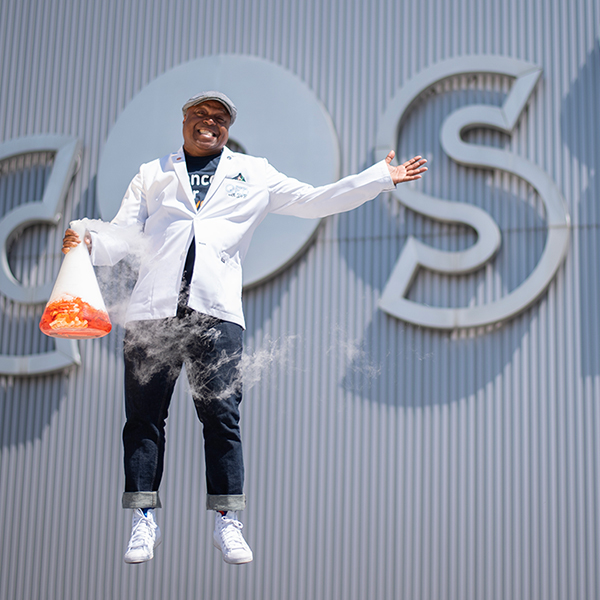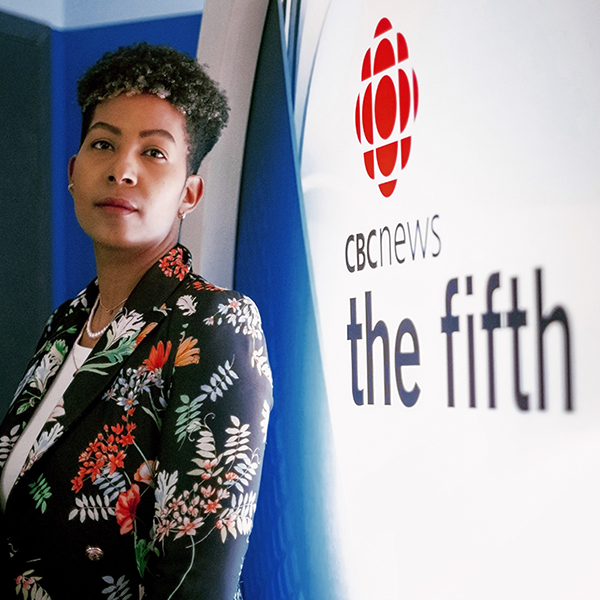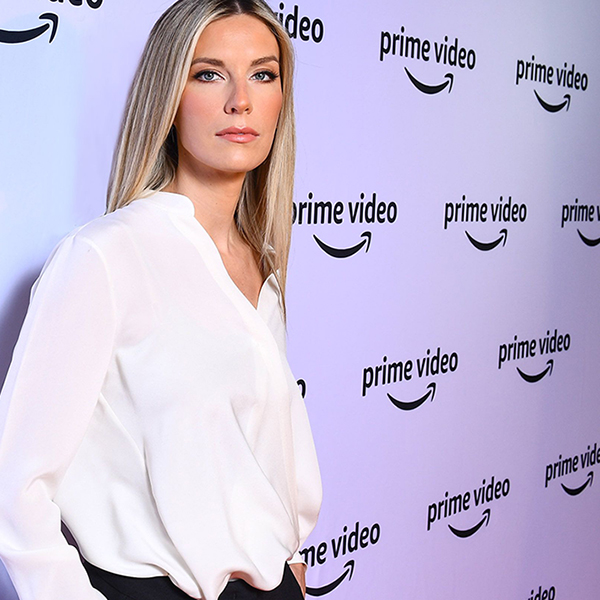A recent report by the Ontario Human Right Commission (OHRC) that probed anti-Black racial profiling and discrimination by the Toronto Police Service provided few surprises for Anthony Morgan, BCL/LLB’12. In fact, the report supported many of the points that Morgan has been making for years about the Toronto Police Service and the troubling way in which it too often deals with the city’s Black residents.
The OHRC report, which looked at data between 2013 and 2017, concluded that, although Blacks only make up 8.8 per cent of the city’s population, they “bear a disproportionate burden of law enforcement.” The report noted that “Black people were over-represented in use of force cases (28.8 per cent), shootings (36 per cent), deadly encounters (61.5 per cent) and fatal shootings (70 per cent).”
Morgan, a lawyer specializing in racial justice issues and the manager of the City of Toronto’s Confronting Anti-Black Racism Unit, attended the press conference when the report was made public. “As the saying goes, who feels it, knows it,” he told reporters, adding that he hoped the troubling statistics outlined in the report would have an impact on politicians and policy-makers.
In a TEDXToronto talk last fall, Morgan recalled his own childhood years in the city and how police cars would frequently pull up as he and his friends hung out, the officers demanding to know what they were up to and where they lived. From Morgan’s perspective, simply being Black seemed to be enough cause for the police to be suspicious.
Morgan’s voice has become a familiar one in the Canadian media as the fraught nature of the relationship between Black communities and police forces throughout Canada and the United States has come under renewed scrutiny after George Floyd was killed by a police officer in Minneapolis last spring.
Floyd’s death was caught on camera and the shockwaves from that incident are still being acutely felt today. But it wasn’t a unique incident. We’ve seen similar instances – and the outrage and sorrow that they sparked – for years. But this time feels like it might be different, says Morgan.
“I would describe myself as being cautiously optimistic. I think what’s different about this moment is the level of recognition. The way we over-resource our police, the ways in which we could use some of those resources to better support our communities, the way in which the police interacts with Black and other racialized communities – the [general] public seems to be ready and willing to enter into this conversation to a far greater extent than I have ever seen before.”
In his work with the Confronting Anti-Black Racism Unit, Morgan is uniquely placed to help shape that conversation.
The unit exists to ensure that the 22 recommendations and 80 actions called for by the Toronto Action Plan to Confront Anti-Black Racism are implemented. The fact that the plan was unanimously backed by Toronto’s city council gives the unit some actual authority, says Morgan. He regularly hears from activists and officials in other cities who want to find out more about the unit and its work.
“This isn’t just a promise, it’s a commitment, because we received that unanimous support from city council,” says Morgan. The unit has been involved in a wide range of activities, from promoting more Black representation on the city’s boards, committees and tribunals, to offering five-month internship opportunities to Black youth interested in exploring career possibilities at the City of Toronto.
“The demand for our work has skyrocketed recently and it is really challenging to keep up,” says Morgan. “We welcome it, though, my team and I. We have managers and office staff [from city organizations and agencies] reaching out to us about anti-Black racism and how to engage in conversations around that issue. That gives me an increased sense of hope.”
The unit is also involved in training programs for the city’s police officers.
“The police service is always one of the more challenging institutions to engage with on questions of racial justice,” says Morgan. “We deliver training to a few thousand officers as part of their mandatory training, but the message I try to get the public to understand is that training [alone] is not transformative.
“You can’t just do some training and expect that systemic change will suddenly result, so we’ve been working to try to create a broader culture of change – looking at alternatives to policing, scaling back [some of the funding for policing] so that more resources can go into public services and social services, into arts and cultural programs and social work support, but, as you can imagine, those conversations are slow-going because of the culture that we’re up against, of policing and the continued expansion of their budgets and then [the expansion of] their mandates and their activities.”
Morgan is playing a leading role in another initiative that is trying to reimagine how Black Canadians engage with the justice system.
Along with criminal lawyers Faisal Mirza and Emily Lam, Morgan is the co-founder of the Sentencing and Parole Project, an initiative that hopes to provide judges and parole boards with a more comprehensive understanding of the lives of Black individuals from marginalized backgrounds before they render judgments on them. The project is inspired by a similar program launched in Nova Scotia by social worker Robert Wright.
“We hire forensic social workers who do in-depth reviews to get a real sense of what an offender’s life has been like and how they ended up involved in the situation that led to their arrest,” says Morgan. “The individual is interviewed, along with their family members and other people who are close to them. We use the information in those reports to help judges and parole boards make decisions that are more fair and more accurate.”
Morgan says that the standard pre-sentencing reports that are typically used for these situations “are often created by probation officers or other folks who work for the office of the attorney general, the very same administration that is sentencing this person to incarceration or considering their release.”
Those reports “are typically quite scant on details, they’re very limited about what you understand about the offender. It could actually make you want to be a bit more harsh on the individual, because you don’t have that complex understanding of who they are or where they’re coming from or the factors that led them to where they are today.”
The project “is essentially still in its pilot phase in Toronto,” but it has garnered praise both from judges and from individuals who have been sentenced for crimes. “The ultimate goal would be for judges and parole boards to routinely have access to a more robust way of getting background information [on the individuals they are assessing] and a more nuanced understanding of their lives,” says Morgan.
Morgan knows firsthand that the reasons why some people get involved in criminal activities are complicated. His brother is serving a multi-year sentence in a federal correctional institution.
“That certainly has had a significant impact on how I want to be able to respond to the challenges and the gaps that I’ve seen my brother experience and face,” says Morgan. “Just the dynamic of seeing so many folks who are in prison boxes or who are being charged or who are being arrested who are Black, and then seeing the judges, the clerks, the lawyers, the security guards and a significant amount of every other person who is engaged in the administration of justice not be Black – that already creates this disengagement or lack of belief that the system is actually for you.
“In some way, I want to help close some of those gaps to ensure that there are more just outcomes for people who look like my brother,” says Morgan.
“Something else that I would say on that front is that when it comes to people who are involved in crime, especially if they are young Black men, people pivot quickly to the parents: ‘If their parents had just taught them right, they wouldn’t be involved in gangs or criminal activities.’”
Morgan insists easy explanations like that are overly simplistic and almost always miss the mark.
“I will be starting a master’s degree in international human rights law at Oxford in September. Our sister finished her master’s at Harvard and she is the managing director for the Center for Law, Innovation and Creativity at Northeastern Law School. We all had the same parents. We all grew up in the same household. Two of us are doing really well, one of us fell through the cracks.
“I don’t want to overstate this point,” says Morgan, “but I feel [our case] is illustrative of a broader trend that does not do enough to support the potential of Black people. It happens because of unemployment, it happens because of poverty, it happens because of substance abuse or dependence – these are all factors that end up sapping [young people’s] potential. My parents might not be perfect – no one’s parents are – but they gave us all the same love and attention. So there were factors beyond their control.
“That’s why I ask, how are we investing in our communities? What kinds of supports are being provided to people in terms of access to arts programs and social support programs and mental health programs? I think about what [my brother’s] life would be like if those supports had been more readily available and if they had been more accessible than the more negative elements that he ended up getting caught up in.”


